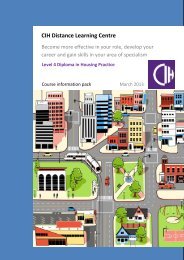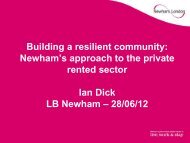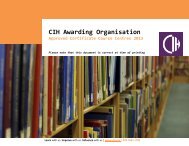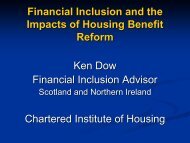View publication - Chartered Institute of Housing
View publication - Chartered Institute of Housing
View publication - Chartered Institute of Housing
You also want an ePaper? Increase the reach of your titles
YUMPU automatically turns print PDFs into web optimized ePapers that Google loves.
CONCLUSION – BECOMING A LEARNING ORGANISATION<br />
functionality to embrace the wider ambitions and aspirations <strong>of</strong> individuals. It is also<br />
seen as extending beyond the workplace to the communities in which organisations<br />
operate. This represents a more three-dimensional or holistic approach to learning which<br />
is based on the belief that when individuals are supported to develop all <strong>of</strong> their talents,<br />
they are able to contribute to the organisation in more creative and enthusiastic ways. It<br />
is also based on a conviction that developing skills and learning are keys to unlocking<br />
opportunities and supporting greater self-sufficiency in the communities in which<br />
housing providers work.<br />
Managing talent – Organisations will need to take a more joined-up approach to<br />
identifying, nurturing and rewarding talent in the workforce. Everything that is done to<br />
recruit, retain, develop, reward and support performance is part <strong>of</strong> talent management;<br />
and this should be incorporated into strategic workforce planning. A more joined-up<br />
approach to talent management can support organisations to ‘grow their own’ leaders<br />
in the future.<br />
Maximising value from learning – Creating opportunities for transferrable and<br />
collective learning have been identified above as characteristics <strong>of</strong> learning<br />
organisations. However, in tougher economic times where training and development<br />
budgets are being looked at with greater scrutiny, organisations need to think in a more<br />
focused way about how they get the best value for money from learning opportunities.<br />
There is a crucial role here for management development. There needs to be much more<br />
effective development <strong>of</strong> managers (especially middle managers) so they can appreciate<br />
learning and are not challenged when staff present transformational or creative ideas.<br />
This will require a different approach to management – less focused on micromanagement<br />
or process management and more focused on seeing the bigger picture<br />
and achieving business outcomes. In addition, there also needs to be better<br />
understanding <strong>of</strong> whole-person learning supported by quality person-centred one-toones<br />
and appropriate recognition and reward schemes (explored below).<br />
Creative approaches to recognition and reward – Learning organisations recognise<br />
the importance <strong>of</strong> developing fair and equitable strategies for recognition and reward.<br />
Adequate recognition and reward should apply to all staff at all levels <strong>of</strong> the<br />
organisation, not just at levels <strong>of</strong> leadership or visibility. Rewards may be linked to pay<br />
and bonuses, but they may also be more intangible. For example, a report for the Work<br />
Foundation 72 identified that the actual content <strong>of</strong> work, the opportunity to fulfil<br />
personal goals and flexible approaches to working hours were almost as important as<br />
149

















